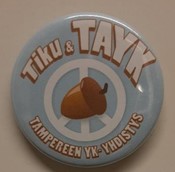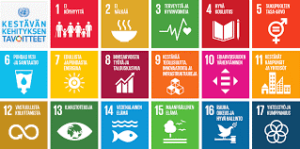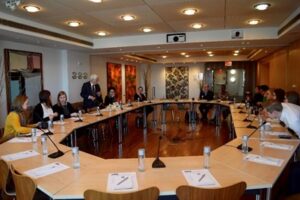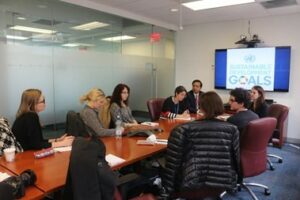Tarja Seppä
Tarja Seppä (PhD) is a retiring international relations and peace studies lecturer at Tampere University. She has been a remarkable asset for TAYK, and in her work she has kept themes of our common interest alive in Tampere University. At Tarja’s retirement seminar 25.1.2021, TAYK ry gifted her with immaterial gifts from UNICEF and UN Women and presented her with a Certificate of Gratitude for all she has done for our association. As a final favour, we asked her to write about her memories with TAYK, and experiences teaching UN related matters at the University. TAYK ry wants to thank Tarja for her continuous support, and wishes her all the best in her retirement.

UN success stories and teachings
UN peacekeeping website describes how peacekeeping operations usually operate in situations where other actors cannot or are not willing to operate. UN peacekeeping operations can achieve results that otherwise would not be possible. However, success is not guaranteed due to the complexity and difficulty of these situations.
Sustainable Development Goals have proceeded, for example the World Food Program was granted the 2020 Nobel Peace Prize. Eliminating hunger and advancing food security is one of the Sustainable Development Goals.
According to the UN’s charter, the UN has the responsibility of upholding peace and security in the world. These aforementioned factors are connected to peace and security. Some have described the UN as the conscience of the world. That’s actually a pretty accurate definition, as it reflects the values and goals of the UN.
However, as the Second Secretary General of the United Nations Dag Hammarskjöld has stated: ”The UN was not created to take mankind to heaven, but to save humanity from hell”.
Often things are hard and complicated, and they don’t always go as planned, but that does not mean that the UN is not working hard to overcome these complex issues. If one tends to think that the UN is not putting any effort to this, that usually means not being familiar with the UN.
The UN’s mission to uphold international peace and security is beneficial to interpret widely, and when understanding the situation this way, the UN’s mission touches every faculty and degree programme in Tampere University. This can be perceived clearly especially when looking at the Sustainable Development Goals:

Tampere University has committed to sustainable development, and advancing the Sustainable Development Goals. However, there is still much work ahead and, from my point of view, TAYK has a central role in this task.
About teaching
I strongly believe that the UN – widely interpreted – should be visible in the teachings of different degree programmes a lot more.
As Finland joined The EU in 1995, the situation understandably received a lot of attention in tuition and research. Unfortunately, at the same time it appeared to override the interest in the United Nations, and it seems the situation has not changed.
Dear members of TAYK, please continue to strongly raise these questions in your curriculum working groups. From the point of view of one’s own degree programme and specialisation alternative, each and every one can consider how to link teachings of the UN into the curriculum.
TAYK has been upholding meritoriously annual Peace Day -tradition, and the Peace Day seminar has always included interesting speakers about varied themes. This has been a key piece of our cooperation, for there has been a chance to receive compensation in peace- and conflict studies by composing a lecture diary or an essay of the Peace Day theme of the year. This same opportunity could be proposed to other degree programmes as well, depending on the theme of the Peace Day.
The viewpoint and opportunity provided by the UN is not always taken into notice.
In the feedback in the UN related courses I have taught during the years, many students have shared that they have come up with completely new ideas and realizations about the interconnectedness of different issues, and how seemingly separate things have common nominators.
Over the course of years, I have held various courses about the UN, the international system, international cooperation, human rights, armed conflicts, conflict resolution, civilian protection, peacekeeping, responsibility to protect and humanitarian law.
We have addressed these themes through lectures, group work, simulations, seminars and different presentations composed by students, through which we have been able to discuss these themes. Shared discussions have always been important and a key part of the learning process. I have many fond memories of these throughout the years.
For example, last autumn, during a course “Responsibility to protect and human rights, question of responsibility” students composed a presentation to be used as a base for conversation. This was a success, even in online format.
What has changed during the years in education about the UN, at least in my own teaching, is the fact that the teaching method has changed from plain lecturing to emphasizing varied group work and other activating methods.
In the end, it is all about cooperation with students and that has been truly delightful. What has also been delightful, is having been able to see that students are able to concentrate and keep interest the whole day in events such as the UN-days (from 9am to 6pm).
Together with students, we traveled to New York to the UN headquarters and visited around ten different UN associations and events in April 2016. The programme was exceptionally intense, we had the chance to do lots of things. The journey included preparing in advance, actively taking part and discussing on the spot, organising an open seminar about the discussed themes after returning home and writing articles about varied themes for the UN Association of Finland. They might still be up on the UN Association’s web page, at least some of them. During the trip, the students met Finns and other people working for the UN, and so the UN became more concrete and humane in the students’ eyes. All in all, the journey was exhilarating. I wish that field trips like this could be organised regularly. If there were many groups organizing the trips, splitting the expenses could be possible, too.

International Peace Institute, New York, April 2016

UNDP Office, New York, April 2016
Thanks
Now I would like to thank all members of TAYK, all boards, the current board, for the great cooperation over the years. It has been exceedingly rewarding. Moreover, I’d like to warmly thank you for the gifts – Even those you were able to direct right where our shared interests are. Certificate of Gratitude got me at a loss of words (for once).
I wish you strength to carry on important and meaningful matters, to which the UN hands over excellent possibilities. Proceed with the work that you meritoriously have started. During difficult times, just like at the moment, it requires special effort but during difficult times they are more needed than ever.
I wish you all the best, good luck, and success for your work.
Warm regards
Tarja
All the photos are taken by Tarja Seppä
